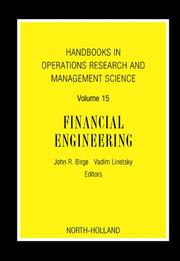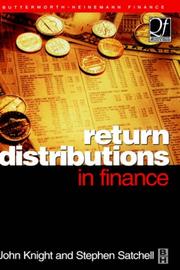| Listing 1 - 10 of 22 | << page >> |
Sort by
|
Book
ISBN: 0128015616 0128017503 1336280654 9780128017500 9780128015612 Year: 2015 Publisher: Amsterdam, [Netherlands] : Academic Press,
Abstract | Keywords | Export | Availability | Bookmark
 Loading...
Loading...Choose an application
- Reference Manager
- EndNote
- RefWorks (Direct export to RefWorks)
This book bridges the fields of finance, mathematical finance and engineering, and is suitable for engineers and computer scientists who are looking to apply engineering principles to financial markets. The book builds from the fundamentals, with the help of simple examples, clearly explaining the concepts to the level needed by an engineer, while showing their practical significance. Topics covered include an in depth examination of market microstructure and trading, a detailed explanation of High Frequency Trading and the 2010 Flash Crash, risk analysis and management, popular trading strategies and their characteristics, and High Performance DSP and Financial Computing. The book has many examples to explain financial concepts, and the presentation is enhanced with the visual representation of relevant market data. It provides relevant MATLAB codes for readers to further their study.--
Financial engineering. --- Computational finance --- Engineering, Financial --- Finance
Book
ISBN: 0128150661 0128150653 Year: 2019 Publisher: London, England : Elsevier : Academic Press,
Abstract | Keywords | Export | Availability | Bookmark
 Loading...
Loading...Choose an application
- Reference Manager
- EndNote
- RefWorks (Direct export to RefWorks)
Financial engineering. --- Computational finance --- Engineering, Financial --- Finance
Book
ISBN: 0128035765 012803579X 9780128035764 9780128035795 Year: 2016 Publisher: Amsterdam, [Netherlands] : Academic Press,
Abstract | Keywords | Export | Availability | Bookmark
 Loading...
Loading...Choose an application
- Reference Manager
- EndNote
- RefWorks (Direct export to RefWorks)
Finance --- Financial engineering. --- Mathematical models. --- Computational finance --- Engineering, Financial
Book
ISBN: 9814571644 9789814571647 9789814571630 9814571636 Year: 2014 Publisher: New Jersey
Abstract | Keywords | Export | Availability | Bookmark
 Loading...
Loading...Choose an application
- Reference Manager
- EndNote
- RefWorks (Direct export to RefWorks)
Recent Advances in Financial Engineering 2012 is the Proceedings of the International Workshop on Finance 2012, which was held at the University of Tokyo on October 30 and 31, 2012. This workshop was organized by the Center for Advanced Research in Finance (CARF), Graduate School of Economics, the University of Tokyo, and Graduate School of Social Sciences, Tokyo Metropolitan University (TMU). This annual workshop, which was first held in 2011, is a successor to the Daiwa International Workshop (2004 to 2008) and the KIER-TMU International Workshop (2009 to 2010). The workshop was designed for
Financial engineering --- Computational finance --- Engineering, Financial --- Finance --- E-books
Book
ISBN: 0128017279 0128015349 9780128017272 9780128015346 9780128015346 Year: 2015 Publisher: Amsterdam, [Netherlands] : Academic Press,
Abstract | Keywords | Export | Availability | Bookmark
 Loading...
Loading...Choose an application
- Reference Manager
- EndNote
- RefWorks (Direct export to RefWorks)
Risk Neutral Pricing and Financial Mathematics: A Primer provides a foundation to financial mathematics for those whose undergraduate quantitative preparation does not extend beyond calculus, statistics, and linear math. It covers a broad range of foundation topics related to financial modeling, including probability, discrete and continuous time and space valuation, stochastic processes, equivalent martingales, option pricing, and term structure models, along with related valuation and hedging techniques. The joint effort of two authors with a combined 70 years of academic and practitioner e
Financial engineering. --- Business mathematics. --- Arithmetic, Commercial --- Business --- Business arithmetic --- Business math --- Commercial arithmetic --- Finance --- Mathematics --- Computational finance --- Engineering, Financial

ISBN: 1281055131 9786611055134 0080553257 0444517812 9780444517814 9780080553252 Year: 2008 Publisher: Amsterdam ; London : North-Holland,
Abstract | Keywords | Export | Availability | Bookmark
 Loading...
Loading...Choose an application
- Reference Manager
- EndNote
- RefWorks (Direct export to RefWorks)
The remarkable growth of financial markets over the past decades has been accompanied by an equally remarkable explosion in financial engineering, the interdisciplinary field focusing on applications of mathematical and statistical modeling and computational technology to problems in the financial services industry. The goals of financial engineering research are to develop empirically realistic stochastic models describing dynamics of financial risk variables, such as asset prices, foreign exchange rates, and interest rates, and to develop analytical, computational and statistical methods and
Financial engineering. --- Finance. --- Computational finance --- Engineering, Financial --- Funding --- Funds --- Finance --- Economics --- Currency question --- 336.76 --- Geldmarkt. Kapitaalmarkt --- Recherche opérationnelle
Book
ISBN: 1283971526 9814436437 9814436429 9789814436434 9789814436427 9781283971522 Year: 2013 Publisher: Singapore : World Scientific,
Abstract | Keywords | Export | Availability | Bookmark
 Loading...
Loading...Choose an application
- Reference Manager
- EndNote
- RefWorks (Direct export to RefWorks)
Computational finance is an interdisciplinary field which joins financial mathematics, stochastics, numerics and scientific computing. Its task is to estimate as accurately and efficiently as possible the risks that financial instruments generate. This volume consists of a series of cutting-edge surveys of recent developments in the field written by leading international experts. These make the subject accessible to a wide readership in academia and financial businesses. The book consists of 13 chapters divided into 3 parts: foundations, algorithms and applications. Besides surveys of existing results, the book contains many new previously unpublished results.
Financial engineering. --- Finance. --- Funding --- Funds --- Computational finance --- Engineering, Financial --- Economics --- Currency question --- Finance --- Mathematical models --- E-books

ISBN: 0750647515 9780750647519 0080516246 9780080516240 9786611023676 1281023671 9781281023674 6611023674 Year: 2001 Publisher: Oxford ; Boston : Butterworth-Heinemann,
Abstract | Keywords | Export | Availability | Bookmark
 Loading...
Loading...Choose an application
- Reference Manager
- EndNote
- RefWorks (Direct export to RefWorks)
Quantitative methods have revolutionised the area of trading, regulation, risk management, portfolio construction, asset pricing and treasury activities, and governmental activity such as central banking.One of the original contributions in this area is the classic by Cootner entitled 'The Random Nature of Stock Market Prices'. This work investigated the statistical properties of asset prices and was one of the first works to investigate this area in a rigorous manner.Much has happened in this field in the last 35 years and 'Return Distributions in Finance' contains much new i
Financial organisation --- Asset allocation. --- Financial engineering. --- Investments --- Mathematics of investment --- Business mathematics --- Computational finance --- Engineering, Financial --- Finance --- Allocation of assets --- Portfolio management --- Mathematics.
Book
ISBN: 1137435690 1137435682 Year: 2017 Publisher: London : Palgrave Macmillan UK : Imprint: Palgrave Macmillan,
Abstract | Keywords | Export | Availability | Bookmark
 Loading...
Loading...Choose an application
- Reference Manager
- EndNote
- RefWorks (Direct export to RefWorks)
This book provides a first, basic introduction into the valuation of financial options via the numerical solution of partial differential equations (PDEs). It provides readers with an easily accessible text explaining main concepts, models, methods and results that arise in this approach. In keeping with the series style, emphasis is placed on intuition as opposed to full rigor, and a relatively basic understanding of mathematics is sufficient. The book provides a wealth of examples, and ample numerical experiments are givento illustrate the theory. The main focus is on one-dimensional financial PDEs, notably the Black-Scholes equation. The book concludes with a detailed discussion of the important step towards two-dimensional PDEs in finance.
Finance. --- Financial engineering. --- Financial Engineering. --- Business mathematics. --- Differential equations, Partial. --- Partial differential equations --- Arithmetic, Commercial --- Business --- Business arithmetic --- Business math --- Commercial arithmetic --- Finance --- Mathematics --- Computational finance --- Engineering, Financial
Book
ISBN: 1280669012 9786613645944 1848168144 9781848168145 9781848168138 1848168136 Year: 2012 Publisher: Singapore World Scientific
Abstract | Keywords | Export | Availability | Bookmark
 Loading...
Loading...Choose an application
- Reference Manager
- EndNote
- RefWorks (Direct export to RefWorks)
This volume investigates algorithmic methods based on machine learning in order to design sequential investment strategies for financial markets. Such sequential investment strategies use information collected from the market's past and determine, at the beginning of a trading period, a portfolio; that is, a way to invest the currently available capital among the assets that are available for purchase or investment. The aim is to produce a self-contained text intended for a wide audience, including researchers and graduate students in computer science, finance, statistics, mathematics,
Machine learning. --- Financial engineering. --- Computational finance --- Engineering, Financial --- Finance --- Learning, Machine --- Artificial intelligence --- Machine theory --- Financial engineering --- Machine learning --- Investments --- Data processing --- E-books
| Listing 1 - 10 of 22 | << page >> |
Sort by
|

 Search
Search Feedback
Feedback About UniCat
About UniCat  Help
Help News
News